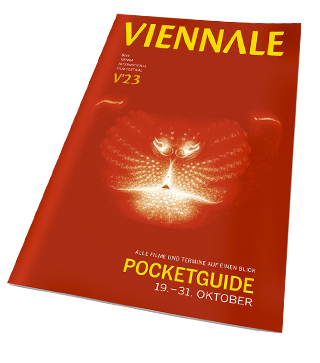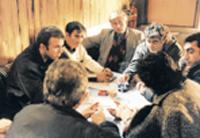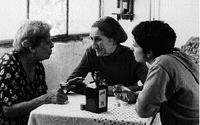V'02 FESTIVALINFO
Viennale 2002: 12 festival days. 244 screenings. 237 films. (Films, that for the most part won´t be shown in the regular film theatres). 76 filmguests and 468 Accreditates. And 70,400 visitors

The Viennale programme 2002 is ambitious in a non speculative way. More than ever the Viennale disassociates itself from the every day cinema and its established values by treading on less known filmic terrain. (Claus Philipp)
Film as a medley. That is also Agnès Varda´s principle. She presented „Deux ans après“, a great tribute to potato-pickers and other residue-consumers as well as to those film makers who want to expose what the rest of the world doesn´t want to see.
"One has to get away from the prejudice thinking when one wants to make such discoveries. And above all, one has to get away from two-classes-theory in film history, USA vs. Europe, Hollywood vs. Avantgarde.“ (Fritz Göttler, Süddeutsche Zeitung)
In the special programm series two films received very good reactions: Agnès Varda´s Deux ans après (world premiere) and the first international presentation of the collected works of Zeki Demirkubuz. Also highly acclaimed were the lecture out of the new book, written by Dietrich Kuhlbrodt and the presentation of the two ´Japanese visuals´programms.
Apart from Deux ans après there were some more world premieres: Sulla (Klaus Wyborny), Vaters Land (Nurith Aviv), Im Anfang war der Blick (Bady Minck), Nach dem Tod des alten Roms (Meinhart Ropp), Turhan Bey – Vom Glück verfolgt (Andrea Eckert), Erwachen aus dem Schicksal (Stephan Settele).
The Viennale also was able to present some (in the festival world) important European premieres: Auto Focus (Paul Schrader), Frailty (Bill Paxton), Last Ball (Peter Callahan), Architecture of Riot (Erika Vogt), Battle Stations – A Navel Adventure (Dominic Angerame), Nightingale (Lee Ann Schmitt), National Archive V.1 und An Injury to One (Travis Wilkerson), Une vie nouvelle (Philippe Grandrieux).

Jacques Rivette is the most undetected, mysterious and probably also least-known director among the legendary filmmakers of the French “Nouvelle Vague”.
The festival presented the first complete retrospective on Jacques Rivette in Austria, including his seldom-shown twelve-and-a-half-hour series Out 1: Noli me tangere (1970).
The Viennale also succeeded in convincing Jacques Rivette to put together a collection of his favorite films and juxtapose them with his own films.

The “Yoko Ono – FROM MY WINDOW” exhibit, which was shown in the Klaus Engelhorn Galery to a major response from the media, and was personally introduced by the artist herself.
As hoped, an unforgettable event was the result. Unfortunately, it could not be witnessed by the mass of visitors who showed up; the gallery’s window was so steamed up after a short time that even this view from the sidelines was cut off.
Surrounded by hundreds of guests and numerous photographers and camerapeople, Yoko Ono opened her show with a short speech and a poem.
Galerist Klaus Engelhorn and Hans-Peter Wipplinger, the show’s initiator, limited themselves to minimalist versions of their prepared speeches so that the guests both inside and outside the gallery (the latter group included a few international journalists who came especially for this event) could begin their tours of the show as soon as possible. Quiet contemplation of individual works was of course impossible in light of the circumstances, but as the show has been extended to November 20th, there will be sufficient time for that later.

















